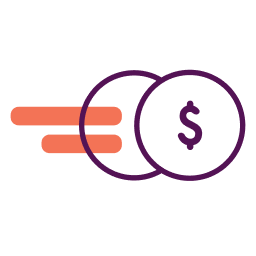Small business owners have many expenses, and maybe the most consistent one is payroll. The people who work for you, whether they’re full-time, part-time, or contract, expect to be paid on time. But what happens when your own clients haven’t paid you or you have a slow month? You’re still responsible for paying those employees on time…or you risk them leaving.
A small business payroll loan can bridge the gap between payday and you getting income.
What is a Payroll Loan?
Payroll loans are small business loans you can use to pay your staff. There are several types of loans you can use; some require you to use the funds specifically for payroll, while others are more flexible in how you use them. We’ll cover your financing options shortly.
How Do Payroll Loans Work?
Whereas some small business loans can be used for working capital, to purchase equipment, or to buy real estate, payroll loans are (sometimes) designed specifically for covering payroll costs. These costs include salary, payroll taxes, and employee benefits.
When is a Payroll Loan a Good Idea?
Payroll costs are likely one of your bigger expenses if you have many full-time employees. There are sometimes financial situations (a global pandemic, for example) when you have unexpected expenses or less revenue than anticipated, and that’s when you might struggle to cover payroll.
Rather than pay your staff late, which could incite panic, you can take out a payroll loan to ensure everyone gets their paycheck on time, and then you can pay it back when things pick up financially.
How Cash Flow Affects Payroll
A 2019 study by Intuit revealed that nearly two-thirds of business owners have had cash flow troubles, and that nearly half of those have had trouble paying employees or themselves because of these issues. However, managing your cash flow and using financing when needed can allow you to avoid these problems.
Because payroll is an overhead expense and because it’s time-sensitive, your cash flow affects it. Having cash readily available allows you to pay employees on time and in full. Small businesses often pay their employees by check, which means they have to have enough cash in the bank to cover those checks when they’re cashed. Your business can avoid having to move money around or put off paying other expenses in order to pay your employees on time by managing cash flow effectively.
Having enough money to pay your employees on time isn’t just good for your cash flow statement — it helps you retain employees, too. Using small business payroll loans, business credit cards, or business lines of credit can help you open up cash flow to ensure your employees’ paychecks are in the bank when you send them out.
Types of Loans You Can Use for Payroll
Borrowers looking for loans to cover payroll expenses have a few choices. How much you pay in interest and fees will depend on the type of loan, your credit scores, and other factors.
SBA loans
The Small Business Administration has several loans that can be used for payroll and other business expenses, including the 7(a) and microloans.
Also, while applications are closed for the Paycheck Protection Program (PPP), which was designed to help business owners pay staff during the worst of the coronavirus pandemic, if you received those funds, you can use them for payroll expenses. If you use them for specified expenses, you may qualify for PPP loan forgiveness. Lenders include:
- SmartBiz
- Celtic Bank
Business loans
There are both long-term and short-term loans available from banks and online lenders that can help you with payroll expenses. The higher your credit scores, the better loan options you’re likely to be eligible for: think lower rates and longer repayment terms. You may even be able to qualify for a higher loan amount.
Be aware that some short-term loans have higher interest rates, so focus on repaying them quickly to cut down on what you pay. Check out these lenders:
Merchant cash advance
Though cash advances can be expensive, they can also come in handy when you need cash yesterday to pay your team. Rather than a loan, these are an advance on future sales. Your payment will be automatically taken from credit and debit card transactions daily or weekly. These are merchant cash advance companies we recommend:
Business credit cards
While they might not be ideal for paying payroll, having a business credit card can help you cover other expenses, like inventory or office supplies, which frees up your cash to pay your staff. Here are a few to consider:
Invoice factoring
Invoice factoring, or accounts receivable factoring, is an option for small businesses that have a high volume of invoices with customers and need business funding but may not qualify for a traditional loan. Unlike a bank loan, invoice factoring allows the small business to sell its unpaid invoices (accounts receivable) to a financial institution known as a factoring company, which then fronts the small business 70% to 90% of the value of those invoices. The factoring company then takes over collecting on those invoices, and may also assess fees to you based on how long it takes the invoices to be paid or fees per invoice. This can be a good injection of cash for businesses in manufacturing, health care, distributions, or IT companies where you have a high level of invoices.
What to Consider When Choosing a Payroll Loan
In a perfect world, you’d borrow money with 0% interest, but the reality is: lenders want to profit from the loan. But the lower the annual percentage rate you pay, the less the payroll loan will cost you in the long run.
Look at both your business and personal credit scores to see what kind of financing you’ll qualify for. If your credit is stellar and you can wait a few months to get your loan proceeds (maybe not, if you’re struggling right now to pay payroll), an SBA loan or bank loan could be a good fit. If you need the money now and don’t have great credit, you may need to look at short-term loans or merchant cash advances.
Also, keep in mind: the faster you make those loan payments, the less you’ll pay in interest, so consider whether you can afford to pay your loan off early, and see if your lender charges a penalty fee for doing so.
How to Qualify for a Payroll Loan
Lenders may vary in their qualifying criteria for eligibility. Many look at your credit history and business credit scores to determine what interest rate and loan terms they can offer you.
Others may put less focus on your credit and may instead look at how long you’ve been in business and your annual revenues, which give an indication of your ability for on-time repayment.
It’s a smart idea to know your credit scores before applying so you know what types of loans you’ll qualify for.
How to Get a Payroll Loan
The loan application process for one payroll loan may look different from one lender to another. Banks may require you to come into a branch to apply, while alternative lenders may offer a quick online application.
Generally, you’ll need to provide details on your business, including address, name, business structure, time in business, and annual revenues. You’ll also need to give information about yourself and any other business owners, including Social Security numbers and contact info.
You may also be asked to connect your bank account so your loan funds can quickly be deposited (sometimes as soon as the next business day).
If you are approved for a loan, carefully read your loan agreement, which will tell you the amount of the loan and interest rate, as well as what the monthly payment will be. Sign the agreement and then wait for the funds to hit your account so you can get those employees paid.
What Happens If I Can’t Make Payroll?
Beyond keeping your employees happy and upholding your retention rates, making payroll allows you to avoid fines and lawsuits — and not just from your employees. If you don’t pay payroll taxes, government agencies like the IRS may come after you as well. It’s important to anticipate payroll problems and make sure you handle them before they become a problem, potentially by using small business payroll loans or other business financing.
Pros and Cons of Getting Payroll Loans
It’s a good idea for any small business owner to consider the pros and cons of getting a payroll loan before applying.
Pros
- Gives you access to additional cash flow to keep your business operations running
- Helps keep employees happy (and drives retention)
Cons
- Payroll business loans can only be used for payroll
- May have high interest rates
- May have shorter repayment periods
Nav’s Verdict: Payroll Loans
Rather than struggle to pay your employees, taking out a payroll loan can be a wonderful way to ensure everyone is paid on time and feels secure at your company. The best loan for your business needs will depend on a number of factors. Nav can help you find the loan offers or funding options you’re most likely to qualify for by using your company’s individual information. Sign up with Nav today to start seeing your best options.
This article was originally written on August 9, 2021 and updated on October 14, 2022.



Thank you for the different ways to apply for loans and all information was very valuable.
Thank for this loan information, it helps me to decide which loan is best for my business needs
Thank you, NAV!!!!!!
Hey my name is Monica Williams I am interesting in a pay roll loan.